Horticulture news
The Northern Ireland Soft Fruit Growers Association (NISFGA) will represent the needs and interests of members
Northern Ireland’s first-ever soft fruit association has been formed.
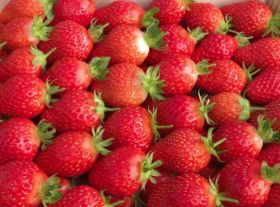
The Northern Ireland Soft Fruit Growers Association (NISFGA) will represent the needs and interests of members, as well as helping growers develop and improve their operations.
The Northern Irish soft fruit sector’s output is currently valued at £700,000 per annum, which, although small in comparison to the apple-dominated top fruit sector, shows the category’s burgeoning potential.
NISFGA plans to promote a Love Local campaign and offer a range of services to members.
The association is currently in consultation with growers and government officials to determine the needs of the sector and how it can be supported.
NISFGA came about from a project supported by the Supply Chain Development Programme, where six growers met regularly to share information and advice.
Soft fruit production in Northern Ireland is dominated by strawberries (184 tonnes), followed by raspberries (19.9 tonnes) and gooseberries (9 tonnes).
Sector saw turnover rise and created more jobs last year in spite of economic downturn
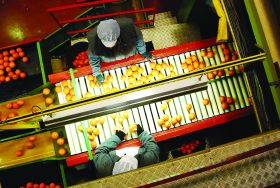
Spain’s agrifood cooperatives have weathered one of the most challenging economic periods in the country’s history, posting an 8% increase in turnover in 2013. According to data from the Observatory of Agrifood Cooperatives (OSCAE) presented during the general assembly of Cooperativas Agro-alimentarias (Spanish Agrifood Cooperatives) turnover rose from €23.82bn to €25.69bn in the past year.
The cooperative grouping, which represents Spain’s 3,844 cooperatives working in the agrifood sector, cited stronger prices across some of the country’s main agricultural products, including fruits and vegetables, olive oil, olives and wines, as the main reason for the improved results.
The data shows that the cooperative sector increased its presence on international markets and now account for 27% of Spain’s total export turnover in the food industry.
The number of workers employed by its members went over by 8.25% in the five years between 2007 and 2012, proving the important role the sector plays in job creation and growth, the group said.
Cooperativas Agro-alimentarias held its general assembly in Madrid last week, during which Angel Villafranca was elected as the group’s new president. Villafranca, who also heads up the Agrifood Cooperatives of Castilla-La Mancha, replaces Fernando Marcén, former president of the Agrifood Cooperatives of Aragon.
Villafranca said the new presidency would continue “with the policy of effort and integration of our food companies, carried out by Fernando Marcén with unmistakable success and by organisational expertise of the entire professional team.”
Among the objectives set out by the new presidency, Villafranca said the focus would be on further consolidation and integration in the coming years. He said Spain’s agricultural production outside the cooperatives could not continue in their present disorganised and atomised state, and called for “an urgent restructuring process that allows us to minimise the effects of increasing external competition and highly concentrated customers, maximising the benefits from the internationalisation process, particularly in emerging markets”.
UK’s largest retailer announces completion of ‘milestone’ deal with Chinese firm CRE, creating China’s biggest food retailer
Tesco has completed a joint venture with Chinese retailer China Resources Enterprise (CRE) to create the largest food retailer in China.
Tesco will own 20% of the chain and CRE will own 80%, according to the BBC.
The move, first announced in October 2013, will join Tesco’s existing outlets in the country with CRE’s stores, known as Vanguard.
“We’re very pleased to have completed this historic agreement. The partnership creates a strong platform in one of the world’s largest markets,” said Tesco CEO, Philip Clarke. “We can now combine our strengths to build a profitable multichannel business, offering our customers in China the best of modern retail.”
Hong Jie, CEO of CRE, said the venture is a “major milestone” for CRE’s business development. “We believe that this partnership is one that combines the strength of both parties and enables the JV to become the leading multi-format retailer in Greater China, through improved operations, better growth and enhanced profitability,” he said.
Last month, Clarke confirmed the UK’s largest retailer is committed to pursuing “disciplined” international growth in light of falling annual group profits for the second year in a row.
He said the group would reduce its investment in Europe and focus on its high-returning markets in Asia, namely Korea, Malaysia and Thailand, as well as new ventures in China and India.
In April, Tesco reported a 6% fall in group trading annual profit to £3.3bn and a drop in like-for-like sales by 1.4%.
Group trading profit was also down 5.6% in Asia to £692 m.
As a means of tackling the issue of waste in the supply chain, the UK retailer has launched a new pack of imperfect tomatoes

UK supermarket chain Waitrose has announced that it is selling mixed packs of tomatoes that have either naturally fallen from the vine or are misshapen, as it looks at ways to reduce waste at its stores, The Guardian has reported.
Such tomatoes would not usually be put on sale, but criticism from campaigners has forced retailers to act. Waitrose has previously had success selling misshapen strawberries and plums, as well as weather-blemished apples, at a discount.
Waitrose tomato buyer Peter Cooke commented: “When it comes to tomatoes, there’s absolutely no reason why beauty has to be skin deep. Every one of our mixed selection packs is different, which for me is the real beauty of using tomatoes that wouldn’t normally be offered in this way to customers.”
According to Waitrose, tomatoes are, along with avocados, one of the leading causes of waste in the fruit and vegetables category.
The retailer’s ‘Limited Selection’ tomatoes will reportedly be available in 77 Waitrose outlets in the UK, priced at £2.99 for 1kg. The first pack includes a mixture of round, cherry and baby plum varieties, but each will vary depending on seasonal availability, Waitrose stated.
New study suggests regular grape consumption could protect the retina from deterioration
New research presented recently at the Association for Research in Vision and Ophthalmology conference in Orlando, Florida, has suggested that regular grape consumption may play a role in eye health by protecting the retina from deterioration.
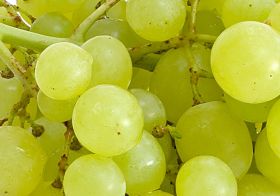
Specifically, the research said that a grape-enriched diet resulted in a protective effect on retinal structure and function.
The retina is the part of the eye that contains the cells that respond to light, known as photoreceptors. There are two types of photoreceptors: rods and cones. Retinal degenerative diseases affect over 5m people in the US, and can cause blindness due to photoreceptor cell death.
The study was conducted by a research team at the University of Miami, Bascom Palmer Eye Institute, and investigated whether a diet supplemented with grapes could protect the photoreceptors in mice that have retinal degeneration. Mice were either fed a grape-supplemented diet corresponding to 3 servings of grapes per day for humans or one of two control diets.
The results showed that retinal function was significantly protected in the mice consuming the grape-enriched diet. The grape-consuming group had three-fold higher rod and cone photoreceptor responses compared with those on the control diets. They also exhibited thicker retinas. Grape consumption also protected retinal function in an oxidative stress model of macular degeneration. Further analysis revealed that the grape diet resulted in lower levels of inflammatory proteins and higher amounts of protective proteins in the retinas.
“The grape-enriched diet provided substantial protection of retinal function which is very exciting,” said Dr Abigail Hackam, lead investigator of the study. “And it appears that grapes may work in multiple ways to promote eye health from signaling changes at the cellular level to directly countering oxidative stress.”
The Association for Research in Vision and Ophthalmology (ARVO) is the largest eye and vision research organisation in the world with eye and vision research members from over 70 countries.
A decision has been taken by the EU to strengthen rules on imports of South African citrus due to the risk of citrus black spot

South African citrus exports to Europe will be subject to stricter controls but will not face an outright ban, Eurofruit has learned, after the EU’s Standing Committee on Plant Health reached agreement on a revised import protocol today in Brussels.
The agreement reached by the committee marks the end of a particularly difficult chapter in the history of trade relations between South Africa and the EU, one which saw producers in Spain, Italy and France demand South African citrus be denied entry on the grounds of a perceived risk of the disease citrus black spot establishing itself in Europe.
According to the new measures, citrus fruits imported from South Africa will be subject to more stringent criteria such as recording pre- and post-harvest chemical treatments and mandatory registration of packhouses, as well as on-site official inspections at citrus orchards.
A sample of at least 600 of each type of citrus fruit per 30 tonnes will have to be taken by the South African authorities, with all fruit showing symptoms to be tested. Moreover, a sample per 30 tonnes of Valencia oranges will also be tested. No distinction between citrus fruits for fresh consumption and citrus fruits for processing is made.
Commissioner for Health Tonio Borg commented: “Plant protection on EU territory is of the utmost importance and the EU had no choice but to impose a stricter inspection regime for South African citrus fruit. Systematic sampling and testing of consignments should prevent this harmful plant disease from taking hold in Europe’s citrus orchards to the detriment of our farming sector. We had to take these measures because of the high number of recent interception of infected citrus fruits at European border controls.”
That perceived risk has been a matter of some contention, with South Africa receiving the backing of trade counterparts in northern Europe and a sizeable group of scientists worldwide despite strong support for a ban from the European Food Safety Authority and Mediterranean growers.
In late November, the EU imposed what amounted to a provisional ban on imports of citrus from the country, but that blockade came to an end at the start of 2014, meaning a further decision on the future of South African citrus in Europe had to be made during what is currently the export trade’s off season.
Jan Doldersum of Rijk Zwaan will champion the use of social media at the upcoming European Vegetable Strategies event

Using social media to grow the salads category is an exciting opportunity for companies provided they also understand the challenges that is poses.
That’s the message that Rijk Zwaan marketing and business development manager Jan Doldersum is going to give to delegates at European Vegetable Strategies 2014, the new international conference event for the European fresh vegetable sector that takes place in Brussels at the start of next month.
Rijk Zwaan, a family-owned business that is one of the world’s leading seed companies, launched its Love My Salad website in Europe a couple of years ago, and opened a “social salad network” in China last year too. The website, which is available in 13 languages at lovemysalad.com, has attracted millions of hits and many thousands of likes from users all over the world. It gives users the chance to inform themselves about salads and to share recipe ideas and much more.
“Social media is a great way to communicate with consumers,” says Jan Doldersum. “But social media requires constant attention, and you’ve got to be very careful about things like internet security. It’s a big challenge.”
Rijk Zwaan is presenting its ideas in keynote sessions at European Vegetable Strategies 2014 at the Hotel Bloom in Brussels on Thursday 5 June. The event opens the previous evening with an informal get-together at Brussels’ renowned art nouveau brasserie De Ultieme Halluncinatie.
Rijk Zwaan is a key sponsor of European Vegetable Strategies 2014, which is organised by Europe’s leading fresh produce trade magazines, Eurofruit, Fruchthandel Magazin, and Fresh Produce Journal.
Some 120-150 senior managers from fresh produce businesses in Europe are due to attend EVS2014 on 4-5 June 2014. More information is available online at http://www.vegetablecongress.com/
Retailer targets greater transparency in effort to position itself as UK market’s fresh-led value food retailer
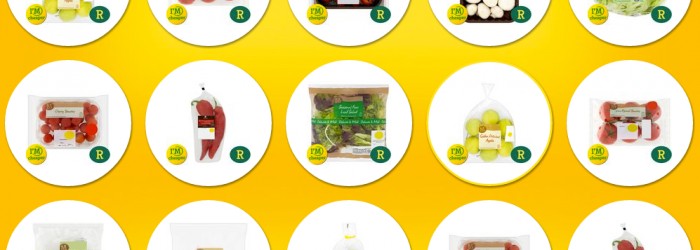
Morrisons, the UK’s fourth-largest grocery retailer, has launched an online price-checking service designed to reassure shoppers that price cuts during any particular week are not simply temporary promotions designed to boost sales in a particular week.
The move follows the company’s recent announcement that it was going to be “permanently cheaper” by pursuing a strategy of price reductions on 1,200 everyday essential items in order to build its reputation as a fresh-led value grocer.
Industry analyst MySupermarket.com, which is running the service, will monitor price reductions across Morrisons’ entire range and publish its findings on the website, providing visual illustrations of individual products’ pricing history.
Shoppers will be able to look at any of the products on offer and check the retailer hasn’t in fact put prices up.
Commenting on the new price transparency website, Morrisons chief executive Dalton Philips said: “We’re serious about getting cheaper and setting new standards in transparency of pricing. We want our customers to be proud of the products they buy and be reassured that they are cheaper. We have nothing to hide.”
The cheaper prices are already being communicated to customers through a new marketing campaign with the strap line ‘I’m Your New Cheaper Morrisons’.
New Zealand is now producing more fruit than it did a decade ago, despite planted area contracting by around a quarter
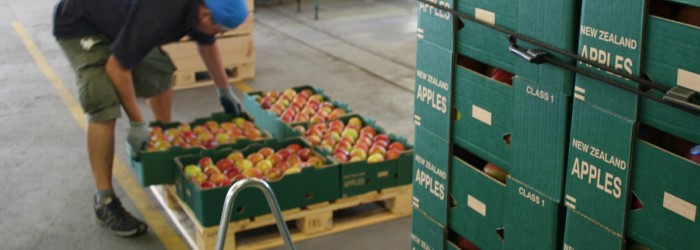
New Zealand is expected to ship around 310,000 tonnes of apples this season – a pleasantly surprising result for the country’s growers during what is an off year in their trees’ biennial bearing cycle.
Last year’s full crop yielded a 12% increase in shipments overseas to 324,684 tonnes, according to industry body Pipfruit NZ, and this year’s export volumes had been expected to fall back in line with a downturn in production to around 480,500 tonnes.
However, exporters had already expressed confidence at the start of the 2014 campaign about the prospects for NZ apples, mainly based on the anticipated demand for smaller-sized fruit in key markets such as the UK and the fact that frosts in Chile and hail in South Africa would mean availability of those sizes was under pressure from the start of the season.
New Zealand’s apple export trade has also been aided by a further increase in demand from the developing Asian market, where volumes sold to China and Hong Kong increased from 15,268 tonnes in 2012 to 21,443 tonnes last year, despite a temporary suspension of shipments in September.
The country’s top five export markets in 2013 were the UK (44,312 tonnes), US (), Netherlands (), Thailand () and Belgium (). A significant proportion of shipments to the Netherlands and Belgium were re-routed to other markets across Europe, with demand boosted by a smaller Northern Hemisphere crop and, again, damage to crops in Chile and South Africa.
Thailand, meanwhile, has emerged as one of the shining examples of successful market diversification: in just five years, it has gone from importing less than 8,000 tonnes of NZ apples to almost 28,000 tonnes in 2013.
Similar dramatic increases have been observed in the UAE, which imported 18,404 tonnes in 2013 – four times the 2008 figure; in India, up from 4,966 tonnes to 14,330 tonnes during the same period; and in Vietnam, now taking around 3,000-4,000 tonnes compared with just 750 five years before.
New Zealand also appears to be reaping the rewards of a sizeable increase in productivity as the sector has consolidated in the post-deregulation era.
Figures released by Pipfruit NZ show that, while planted area for apples has declined by nearly 25% since 2005, production of export-grade fruit is at a similar, if not higher, level now to that seen a decade ago.